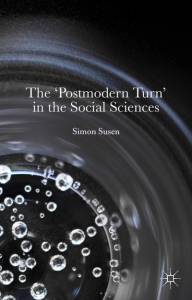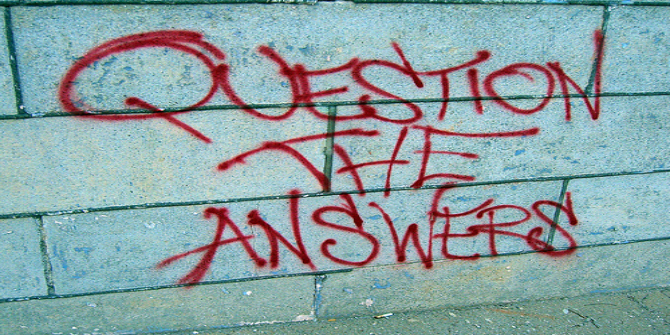In The ‘Postmodern Turn’ in the Social Sciences, Simon Susen traces the epistemological shift from modern to postmodern thought and the influence of this transformation on the social sciences. While admiring of his comprehensive descriptive accounts of the projects of modernity and postmodernism, Sarah Burton is left feeling that the lack of penetrating critique or analytical ‘bite’ may be symptomatic of the very postmodern perspective that Susen sets out to interrogate.
The ‘Postmodern Turn’ in the Social Sciences. Simon Susen. Palgrave Macmillan. 2015.
 Simon Susen opens with the declaration that the ‘main aim of this book is to examine the impact of the “postmodern turn” on the contemporary social sciences’ (1), arguing that postmodern thought has ‘substantially shaped’ (1) central assumptions in social scientific thought. He provides a useful definition of ‘the postmodern turn’, it being – in his view – ‘a paradigmatic shift from the Enlightenment belief in the relative determinacy of both the natural world and the social world to the – increasingly widespread – post-Enlightenment belief in the radical indeterminacy of all material and symbolic forms of existence’ (1). The text is organised around five chapters exploring what the author considers key ‘turns’ in social science: the ‘relativist turn’ in epistemology; the ‘interpretive turn’ in methodology; the ‘cultural turn’ in sociology; the ‘contingent turn’ in historiography; and the ‘autonomous turn’ in politics. These are followed by a sixth chapter providing ‘critical reflections’ on the project of postmodernity.
Simon Susen opens with the declaration that the ‘main aim of this book is to examine the impact of the “postmodern turn” on the contemporary social sciences’ (1), arguing that postmodern thought has ‘substantially shaped’ (1) central assumptions in social scientific thought. He provides a useful definition of ‘the postmodern turn’, it being – in his view – ‘a paradigmatic shift from the Enlightenment belief in the relative determinacy of both the natural world and the social world to the – increasingly widespread – post-Enlightenment belief in the radical indeterminacy of all material and symbolic forms of existence’ (1). The text is organised around five chapters exploring what the author considers key ‘turns’ in social science: the ‘relativist turn’ in epistemology; the ‘interpretive turn’ in methodology; the ‘cultural turn’ in sociology; the ‘contingent turn’ in historiography; and the ‘autonomous turn’ in politics. These are followed by a sixth chapter providing ‘critical reflections’ on the project of postmodernity.
Susen argues that the epistemological shift from modern to postmodern thought is one from determinacy to contingency and relativism. The first chapter questions the extent to which postmodern thought has shaped understandings of knowledge formation. Structuring the opening part of the first chapter around three binaries – truth versus perspective, certainty versus uncertainty and universality versus particularity – Susen provides a comprehensive explanation of how these function in the social sciences. He explains the different facets of knowledge that modern thought allows for (that it is based on observation, can be tested, is realist, generalisable, prognostic, rational and factual), and how postmodern thought critiques these tenets of knowledge formation by arguing that the modern is epistemologically naïve and short-sighted, and that reality is contextual, relational and historical (58). This is an undoubtedly fine-grained and comprehensive overview of Enlightenment to postmodern perspectives, though not entirely novel.
 Image Credit: walknboston
Image Credit: walknboston
The sixth chapter is the strongest. Susen examines the central weaknesses of the postmodern programme and reflexively critiques the definitional, methodological and interpretive bases of his own text. He tacitly argues that one of the strongest critiques of postmodernism is, in fact, a defence of the project of modernity. Susen asserts that modernity is an unfinished project that exists in a ‘condition of […] complete incompleteness’ (234), and notes that some of the ‘fundamental points of contention brought forward by postmodern analysis’ are therefore ‘old problems in new clothes’ (240). Susen provides a thorough analysis, touching on the notion that the projects of modernity and postmodernity do not represent a clear paradigmatic break, but rather exist on a continuum of social thought. The latter part of the chapter critiques the project of postmodernism for various weaknesses, including idealism, aestheticism, nihilism and identitarianism amongst others. The most convincing of these is the evaluation of postmodernism’s textualism. Susen argues against what he sees as the tendency of postmodernism to reduce social life to textual developments as this perspective fails to engage with the material and structural elements of the social. What postmodernism requires, claims Susen, is to recognise that ‘every form of textuality is socially constituted’ (243). Susen identifies postmodernism as ahistorical and argues that it must engage with the ‘sociohistorical conditions of production’ (244) that shape self and society. This – almost – brings together postmodernism’s textualism and concern for narrative with the need to acknowledge the politically-inflected structures of society. If Susen could resist the temptation to break his analysis into apparently clear-cut thematic sections and binaries, the resulting analysis would be further nuanced by the application of intersectional thinking.
This book supplies a remarkably researched and painstakingly detailed descriptive narrative of a putative shift from modern to postmodern. My central concern is the lack of attention paid to the effect of structural inequalities and hierarchies – class, ‘race’, gender, sexuality, disability – on the formation of (postmodern) knowledge, and its subsequent legitimation in academia. Susen devotes a substantial section of the introduction to unpicking who counts as a postmodern scholar or thinker, and sorts an alphabetised list of central postmodernists into categories including geographical origin, national origin, ‘linguistic specificity’ (24), ‘thematic contributions’ (28) and disciplinary background (30). This should be a fascinating exercise: exposing and critiquing the structural and conceptual grounds on which specific intellectuals and postmodern concepts have been legitimised and engaged with, providing ground on which to examine the widespread influence of postmodern thought and thinkers. However, the section ends with real paucity of analysis as to what these positions mean for the take-up and legitimisation of postmodern thought in the social sciences. Nothing is said about the inequalities that class, gender, ‘race’ or education present, and what these may inscribe in the foundations of postmodern thought.
Further to this, Susen frequently relies on describing the opinions of other scholars, meaning that gleaning his own analysis became something of a frustrating treasure hunt. Just when I thought he was going to add his own new critique to a topic, the chapter ended. Ultimately it seems that Susen is deeply sceptical about postmodernism but – frustratingly – he is rarely clear about his own position. The text is largely exploratory rather than analytical, and Susen consistently privileges description over critique. What is doubly frustrating is that when Susen actually does engage, he’s good. At the end of his categorising of postmodern authors, Susen argues: ‘Surely league tables aimed at capturing the impact of particular scholars in academic fields and subfields are not only contentious and relatively arbitrary, but also potentially dangerous and counterproductive’ (31). More than anything I want to believe that this is covert snark at the neoliberalisation of academia enacted by the Research Excellence Framework. There are other such gems present – drawing attention to the ‘patronizing tendency to draw a clear-cut line between “ordinary” and “scientific” modes of engaging with reality’ (261), identification of social relations as language relations (48) and reflexive thinking about his own definition of postmodernism and methodology (230-32) – but these often lack real bite.
There are clear merits to this book. It is full of fine-grained description and is extremely comprehensive. It is a book that could find a thankful reader in anyone requiring a systematic review of the projects of modernity and postmodernism, and their relative strengths and weaknesses. Despite these virtues, the weighting of description over analysis, together with the lack of engagement with political social structures and the fact that almost all Susen’s analytical statements fall in one single chapter at the end of the text, left me feeling that he has written an extremely postmodern book about postmodernism: depoliticised, ephemeral and, just when you think you’re getting somewhere, it ends.
Sarah Burton is an ESRC-funded doctoral researcher at Goldsmiths College. She works from a multi-disciplinary perspective, and has studied Sociology, English Literature and Education at the universities of Glasgow, Cambridge and Newcastle. Sarah’s central research interests concern processes and practices of writing, and how these relate to knowledge production, especially that knowledge which is deemed legitimate or valuable. Her PhD uses the concept of ‘mess’ to examine the relationship between the craft of writing and the production of legitimate knowledge. Sarah is also a member of the Woman Theory collective, and a British Sociological Association Postgraduate Forum Co-Convenor. Read more reviews by Sarah Burton.
Note: This review gives the views of the author, and not the position of the LSE Review of Books blog, or of the London School of Economics.







Thank you for this Sarah. A helpful, critical analysis!
Best wishes,
Max